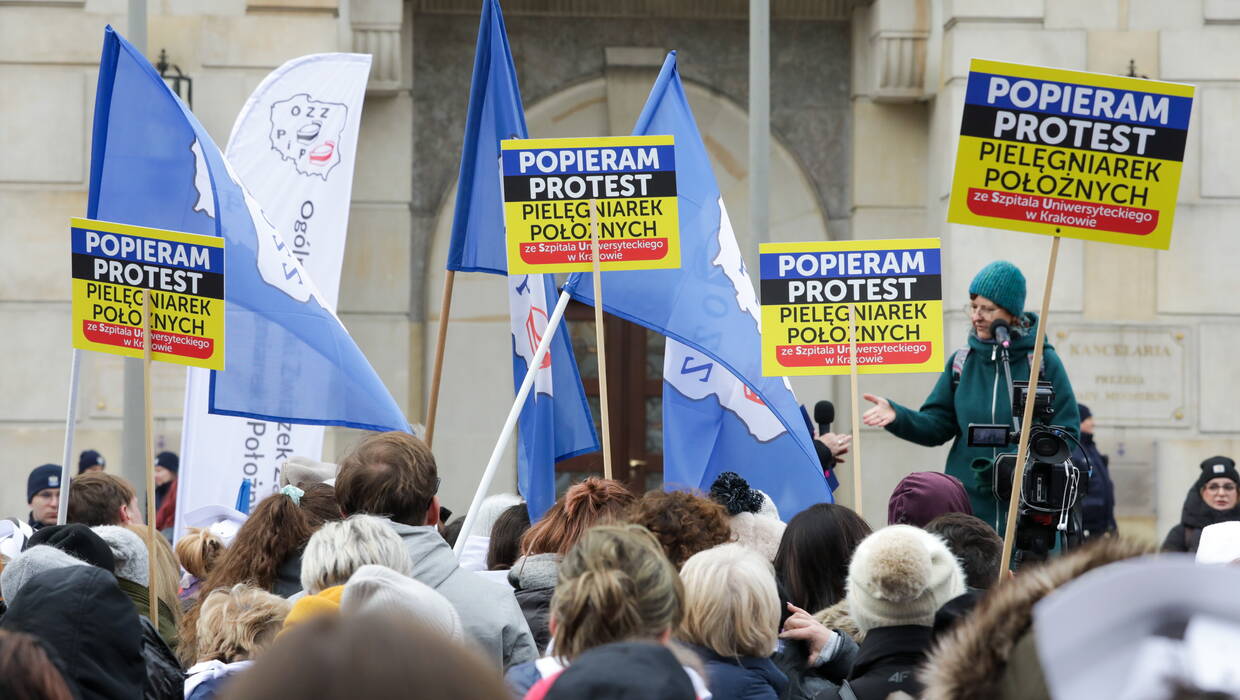
The protest organised by the National Union of Nurses and Midwives (OZZPiP), Poland’s largest union of medical professionals, on Tuesday, called on Prime Minister Donald Tusk to take action following the collapse of talks with the health ministry.
"The time for talks with Minister of Health Izabela Leszczyna is over, we expect talks with the prime minister," said Krystyna Ptok, the chairwoman of OZZPiP.
The protesting nurses want to convince Tusk to accept a citizens' bill on raising the minimum pay in the healthcare sector.
Tusk, who was attending a cabinet meeting on that day, did not meet with the protesters. The petition with the OZZPiP demands was received by Minister for Senior Policy Marzena Okla-Drewnowicz, who declared that she would forward the petition to the prime minister.
In the petition, nurses described the expectations of their professional group towards the government.
"We call for urgent action to limit the negative consequences of the staffing crisis among nurses and midwives," they wrote. They added that too few nursing graduates were taking up employment in the profession, especially in the public healthcare system. They argued that due to the lack of legal solutions nurses and midwives are not paid in accordance with their education, but according to the classification of the position they hold.
During the protest, nurses spoke from the stage about the rising average age in their professional group, the lack of sufficient numbers of nurses and midwives to cover shifts, and differences in the salaries of nurses classified into different groups depending on education.
"We are here to support changes in the citizens' draft law, which creates mechanisms to improve the situation. We want to prevent the degradation of the nursing profession," Ptok said.
The citizens' proposal bases the nurses' remuneration system on qualifications held, not required qualifications. In it, nurses also proposed raising the coefficient for calculating the minimum wage, which would translate into higher pay.
The Ministry of Health announced early this year that there was no money for the increases proposed in the bill. During the work in the subcommittee, the MPs agreed to the ministry's proposal to spread the increases over five installments, from 2025, and award them to two, not four, as the authors of the original bill wanted, groups from the work table.
In September, the parliamentary health and public finance committees decided that the bill would be referred back to the subcommittee. Nurses believe that it has been shelved.
The data of the Agency for Health Technology Assessment and Tariff System (AOTMiT) for 2023 show the average remuneration of nurses and midwives between PLN 8,723 (EUR 2.013) gross and PLN 12,241 (EUR 2.824) gross depending on coefficient.
According to OZZPiP, nurses earn between PLN 6,726 (EUR 1.551) gross and PLN 9,230 (EUR 2.130) gross depending on their education. (PAP)
mr/mf



